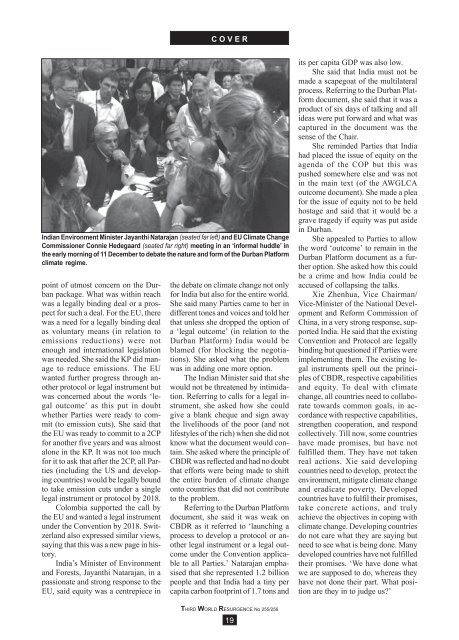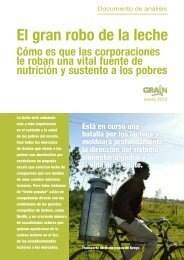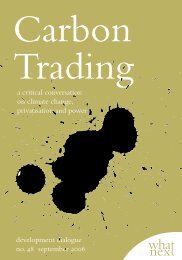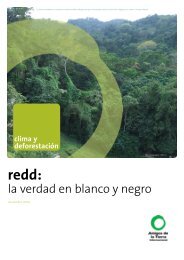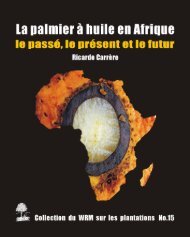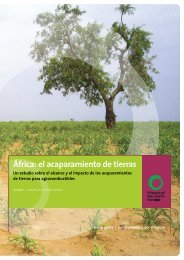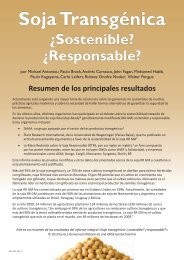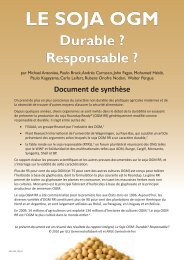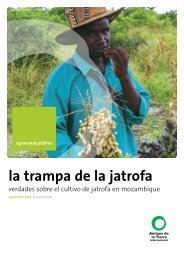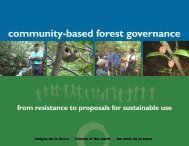C O V E RIndian Environment Minister Jayanthi Natarajan (seated far left) and EU Climate ChangeCommissioner Connie Hedegaard (seated far right) meeting in an ‘informal huddle’ inthe early morning of 11 December to debate the nature and form of the Durban Platformclimate regime.point of utmost concern on the Durbanpackage. What was within reachwas a legally binding deal or a prospectfor such a deal. For the EU, therewas a need for a legally binding dealas voluntary means (in relation toemissions reductions) were notenough and international legislationwas needed. She said the KP did manageto reduce emissions. The EUwanted further progress through anotherprotocol or legal instrument butwas concerned about the words ‘legaloutcome’ as this put in doubtwhether Parties were ready to commit(to emission cuts). She said thatthe EU was ready to commit to a 2CPfor another five years and was almostalone in the KP. It was not too muchfor it to ask that after the 2CP, all Parties(including the US and developingcountries) would be legally boundto take emission cuts under a singlelegal instrument or protocol by 2018.Colombia supported the call bythe EU and wanted a legal instrumentunder the Convention by 2018. Switzerlandalso expressed similar views,saying that this was a new page in history.India’s Minister of Environmentand Forests, Jayanthi Natarajan, in apassionate and strong response to theEU, said equity was a centrepiece inthe debate on climate change not onlyfor India but also for the entire world.She said many Parties came to her indifferent tones and voices and told herthat unless she dropped the option ofa ‘legal outcome’ (in relation to theDurban Platform) India would beblamed (for blocking the negotiations).She asked what the problemwas in adding one more option.The Indian Minister said that shewould not be threatened by intimidation.Referring to calls for a legal instrument,she asked how she couldgive a blank cheque and sign awaythe livelihoods of the poor (and notlifestyles of the rich) when she did notknow what the document would contain.She asked where the principle ofCBDR was reflected and had no doubtthat efforts were being made to shiftthe entire burden of climate changeonto countries that did not contributeto the problem.Referring to the Durban Platformdocument, she said it was weak onCBDR as it referred to ‘launching aprocess to develop a protocol or anotherlegal instrument or a legal outcomeunder the Convention applicableto all Parties.’ Natarajan emphasisedthat she represented 1.2 billionpeople and that India had a tiny percapita carbon footprint of 1.7 tons andits per capita GDP was also low.She said that India must not bemade a scapegoat of the multilateralprocess. Referring to the Durban Platformdocument, she said that it was aproduct of six days of talking and allideas were put forward and what wascaptured in the document was thesense of the Chair.She reminded Parties that Indiahad placed the issue of equity on theagenda of the COP but this waspushed somewhere else and was notin the main text (of the AWGLCAoutcome document). She made a pleafor the issue of equity not to be heldhostage and said that it would be agrave tragedy if equity was put asidein Durban.She appealed to Parties to allowthe word ‘outcome’ to remain in theDurban Platform document as a furtheroption. She asked how this couldbe a crime and how India could beaccused of collapsing the talks.Xie Zhenhua, Vice Chairman/Vice-Minister of the National Developmentand Reform Commission ofChina, in a very strong response, supportedIndia. He said that the existingConvention and Protocol are legallybinding but questioned if Parties wereimplementing them. The existing legalinstruments spell out the principlesof CBDR, respective capabilitiesand equity. To deal with climatechange, all countries need to collaboratetowards common goals, in accordancewith respective capabilities,strengthen cooperation, and respondcollectively. Till now, some countrieshave made promises, but have notfulfilled them. They have not takenreal actions. Xie said developingcountries need to develop, protect theenvironment, mitigate climate changeand eradicate poverty. Developedcountries have to fulfil their promises,take concrete actions, and trulyachieve the objectives in coping withclimate change. Developing countriesdo not care what they are saying butneed to see what is being done. Manydeveloped countries have not fulfilledtheir promises. ‘We have done whatwe are supposed to do, whereas theyhave not done their part. What positionare they in to judge us?’THIRD WORLD RESURGENCE No 255/25619
C O V E RGrenada, speaking forthe Alliance of Small IslandStates, said that theywanted a 2CP with meaningfulnumbers under theKP but did not get that inDurban. Hence, the effortwas to bring up the ambitionlevel through the legalform. Referring to theoptions in the DurbanPlatform document, it saidthat it was difficult to acceptthe option of ‘legaloutcome’ as it appeared tobe an option for climbingdown the ladder in termsof mitigation ambition byallowing countries to continue on thetrack that brought climate change. Ifthere was no legal instrument, Partieswould be relegating vulnerableeconomies to death, with beautifulwords such as ‘access to development’.It said that if ‘they develop wedie’. It could not accept terms withno limits on emissions.Bolivia, in supporting India, saidthere is a need to think of commitmentsto emission reductions but alsoto address the right to development,right to food, right to eradicate povertyetc. The work of the new workinggroup for the Durban Platformmust address this. There is also theright of countries to equitable accessto the atmosphere which has beenused by a small group of countries.In an apparent reference to the US,Bolivia said that it is a paradox that acountry with a large share of the emissionsis not in the KP. When a legalregime is being built, Parties must becareful as to how the atmosphericspace is distributed as those who arerich do not want to cut emissionswhile they want others to do this. Thenotion of a legal instrument applyingto all must take into account povertyand the right to development. Behindthe issues of emissions, there iswealth, misery and poverty and vestedinterests.The Philippines was concernedthat the Convention and the KP werein danger of being a relic of the past.It expressed deep concern that afterover five years of negotiations on theXie Zhenhua (pic), Vice Chairman of China’s NationalDevelopment and Reform Commission, said that developedcountries have to fulfil their promises and take concrete actionsto deal with climate change.further commitments for Annex I Partiesunder the KP, Parties had againfallen short of arriving at a ratifiableamendment to the KP’s Annex B thatwould have ultimately gotten the Protocolout of intensive care and backinto life. It was deeply concerned thatParties had come short of this and hadonce again procrastinated. Partieswere expected to send a strong politicalsignal to the world in the form ofadopting fully ratifiable amendmentsfor the establishment of the secondcommitment period of the Protocol.It was heart-broken to see Parties dividedand made a plea for not pittingone against another. It said they wereagainst one real cruel enemy – climatechange.The Philippines was for environmentalintegrity as well as for sustainableand equitable growth. It stressedthat equity is a fundamental conceptwhose reflection in the processes willensure a fair and just outcome thatachieves the objective of the Convention.It was open to a legally bindinginstrument, as it agreed that a legalregime was important, but it shouldhave been with a view to saving theKP which had not gotten out of intensivecare.Pakistan also said that it stoodbehind equity and CBDR. No matterhow much the world has changed,CBDR is still applicable. It said thatit was strange that there was no reflectionin the document on equity andCBDR. It said that real consensus waswhen everyone was on board and thatno single view should forceothers to submit. Truemultilateralism should haveeveryone on board.El Salvador stressedthe need to raise the levelof ambition and address thefinance gap, the mitigationgap and the equity gap. Ithoped that the processlaunched in Durban wouldtake Parties in the directionneeded.Brazil said that climatechange is a huge challenge,as is fighting poverty, andno country has done moreto reduce emissions thanBrazil. On a legally binding deal, itsaid Parties were on the verge of approvingpotentially what was morethan the Berlin mandate (where theprocess towards the KP was launched)and the adoption of the 2CP under theKP. It was open to a new era of cooperation.Egypt, in response to the EU onthe need for clarity (in relation to mitigation),said there was a need also forclarity on the issue of financial supportwith predictability, additionalityand transparency. It said that developed-countryParties, who were callingfor a new legally binding instrument,did not show the same passionfor the KP. It also stressed the importanceof equity and CBDR. It said thatthe form of the legal outcome shouldfollow the function. There was a needfor flexibility in the Durban Platformto allow for the form of agreementneeded according to what agreementsare reached.Senegal supported Egypt and theneed for CBDR. It said that the Durbanpackage was weak.Gambia, speaking for the leastdeveloped countries (LDCs), reiteratedthe need for a legally binding instrumentthat must provide for strongand binding enforcement to addressall the pillars of the Bali Action Plan.Bangladesh supported the Durbanpackage and a legally bindingdeal, in addition to the 2CP. Althoughthe texts (in relation to the decisions)had been watered down, it was preparedto accept them.THIRD WORLD RESURGENCE No 255/25620


